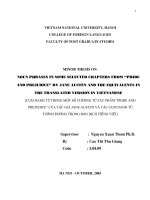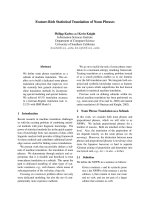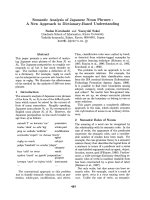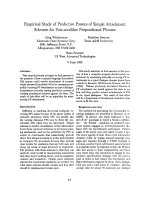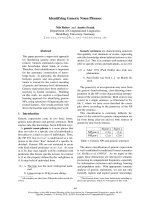NAUTICAL PHRASES
Bạn đang xem bản rút gọn của tài liệu. Xem và tải ngay bản đầy đủ của tài liệu tại đây (161.71 KB, 11 trang )
HA NOI OPEN UNIVERSITY
FACULTY OF ENGLISH AND MODERN LANGUAGES
ASSIGNMENT ON LEXICOLOGY
TITTLE: NAUTICAL PHRASES
HA NOI,2008
Website: Email : Tel : 0918.775.368
Website: Email : Tel : 0918.775.368
PART A : INTRODUCTION
I.Aims of the study
Lexicology (from lexico-, in the Late Greek lexikon) is that
part of linguistics which studies words, their nature and meaning, words'
elements, relations between words (semantical relations), words groups and
the whole lexicon.
The term first appeared in the 1820s, though there were
lexicologists in essence before the term was coined. Computational
lexicology as a related field (in the same way that computational linguistics
is related to linguistics) deals with the computational study of dictionaries
and their contents. An allied science to lexicology is lexicography, which
also studies words in relation with dictionaries - it is actually concerned with
the inclusion of words in dictionaries and from that perspective with the
whole lexicon. Therefore lexicography is the theory and practice of
composing dictionaries. Sometimes lexicography is considered to be a part
or a branch of lexicology, but the two disciplines should not be mistaken:
lexicographers are the people who write dictionaries, they are at the same
time lexicologists too, but not all lexicologists are lexicographers. It is said
that lexicography is the practical lexicology, it is practically oriented though
it has its own theory, while the pure lexicology is mainly theoretical.
Website: Email : Tel : 0918.775.368
2
Website: Email : Tel : 0918.775.368
Phraseology is a branch of lexicology, together with
lexicography.It studies compound meanings of two or more words, as in
"raining cats and dogs". Because the whole meaning of that phrase is much
different from the meaning of words included alone, phraseology examines
how and why such meanings come in everyday use, and what possibly are
the laws governing these word combinations. Phraseology also investigates
idioms.
Moreover,the world of sail gave us more pharses and
sayings than any other occupation.It is Sailor’s lingo or nautical phrases.
II.Methods of the study
To finish my study on this topic,I need to read the
book”Lectures on Lexicology_Third edition”of Dang Tran Cuong,pay
attention on some evidences that are useful for my topic and take note all of
them.Moreover,I also search for more information on thhe internet and then
filter that information.
III.Scope of the study
Study phrases,nautical phrases.
IV.Design of the study
Part A: Introduction
Aims of the study
Methods of the study
Scope of the study
Design of the study
Website: Email : Tel : 0918.775.368
3
Website: Email : Tel : 0918.775.368
Part B: Development
Part C: Conclusion
PART B : DEVELOPMENT
Nautical phrases
Many phrases that have been adopted into everyday
use originate from seafaring - in particular from the days of sail. Virtually all
of these are metaphorical and the original nautical meanings are now
forgotten. That association of travel and metaphor is significant in that the
word metaphor, itself metaphorical, derives from ancient Greek for 'to carry'
or 'to travel'. The influence of other languages and other cultures is evident
in many of the long list of English phrases that have nautical origins.
It is an undoubted fact that seafaring is also the
source of more false etymology than any other sphere. This can be attributed
to the attractiveness of the romantic image of horny-handed sailors singing
shanties and living a hearty and rough life at sea. After all, it sounds
plausible that 'cold enough to freeze the balls off a brass monkey' comes
from brass ship's fittings and that POSH means 'Port out, starboard home',
but neither of these is correct. CANOE, the Committee to Ascribe a Naval
Origin to Everything, don't really exist, but the number of such false trails
might make one believe that they do.
Website: Email : Tel : 0918.775.368
4
Website: Email : Tel : 0918.775.368
It is lucky for us, in our endeavours to distinguish
truth from falsehood, that activities at sea have been scrupulously recorded
over the centuries, in insurance records, newspaper accounts and, not least,
in ships' log books. The term log-book has an interesting derivation in itself.
An early form of measuring a ship's progress was by casting overboard a
wooden board (the log) with a string attached. The rate at which the string
was payed out as the ship moved away from the stationary log was measured
by counting how long it took between knots in the string. These
measurements were later transcribed into a book. Hence we get the term
'log-book' and also the name 'knot' as the unit of speed at sea.
The list below are phrases that have documentary
evidence to support the claim of a nautical origin:
A shot across the bows
Anchors aweigh
Batten down the hatches
Between the Devil and the deep blue sea
Broad in the beam
By and large
Chock-a-block
Close quarters
Copper-bottomed
Cut and run
Get underway
Give a wide berth
Go by the board
Website: Email : Tel : 0918.775.368
5


